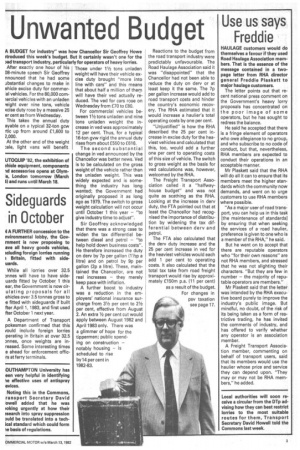Unwanted Budget
Page 3

If you've noticed an error in this article please click here to report it so we can fix it.
At the other end of the weight ale, light vans will benefit Those under 11/2 tons unladen weight will have their vehicle excise duty brought "more into line with cars" and this means that about half a million of them will have their ved actually reduced. The ved for cars rose on Wednesday from €70 to £80.
For commercial vehicles between 11/2 tons unladen and nine tons unladen weight the increase in ved was approximately 12 per cent. Thus, for a typical 16-ton gvw rigid the annual duty rises from about £550 to £616.
The second substantial change in ved announced by the Chancellor was better news. Ved is to be calculated on the gross weight of the vehicle rather than the unladen weight. This was widely expected and is something the industry has long wanted; the Government had originally proposed it as long ago as 1979. The switch to gross weight calculation will not occur until October 1 this year — "to give industry time to adjust".
Sir Geoffrey acknowledged that there was a strong case to widen the tax differential between diesel and petrol — "to help hold down business costs". He therefore increased the duty on dery by 7p per gallon (11/2p a litre) and on petrol by 9p per gallon (2p a litre). These, maintained the Chancellor, are not real increases — they merely keep pace with inflation.
A further boost to industry was a reduction in the employers' national insurance surcharge from 31/2 per cent to 21/2 per cent, effective from August 2. An extra 1/2 per cent cut would apply between August 1982 and April 1983 only. There was
a glimmer of hope for the tippermen; public spend ing on construction — notably housing — is scheduled to rise by 14 per cent in 1982-83. Reactions to the budget from the road transport industry were predictably unfavourable. The Road Haulage Association said it was "disappointed" that the Chancellor had not been able to reduce the duty on dery or at least keep it the same. The 7p per gallon increase would add to road transport costs and hinder the country's economic recovery. The RHA estimated that it would increase a haulier's total operating costs by one per cent.
"Unjustified" is how the RHA described the 25 per cent increase in excise duty for the heaviest vehicles and calculated that this, too, would add a further one per cent to operating costs of this size of vehicle. The switch to gross weight as the basis for ved calculations was, however, welcomed by the RHA.
The Freight Transport Association called it a "halfwayhouse budget" and was not quite as scathing as the RHA. Looking at the increase in dery duty, the FTA pointed out that at least the Chancellor had recognised the importance of distribution by widening the tax differential between dery and petrol.
The ETA also calculated that the dery duty increase and the 25 per cent increase in ved for the heaviest vehicles would each add 1 per cent to operating costs. It also calculated that the total tax take from road freight transport would rise by approximately £150m p.a. (11 per cent) as a result of the budget. For changes in psv taxation see page 17.


































































